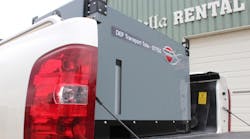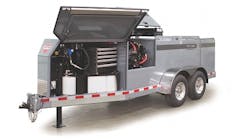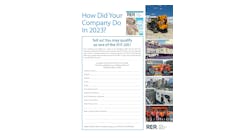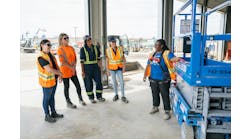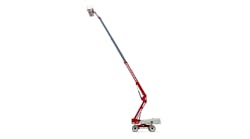By Luke Van Wyk, general manager, Thunder Creek Equipment
Tier 4 Final equipment goes against the grain of the rental business model. Most want the simplest, stripped-down machine they can get their hands on. New high-horsepower heavy equipment with Selective Catalytic Reduction (SCR) technology challenges that notion by introducing an entirely new maintenance point: diesel exhaust fluid, or DEF.
It doesn’t have to be difficult. For the rental house or the customer.
In this article we’ll examine the unique challenges that DEF handling and storage presents both the rental house and the customer, and recommend a few easy ways for rental providers and customers alike to ensure their equipment runs efficiently while also protecting the engine technology inside.
Challenges:
Manufacturers of high horsepower diesel engines, specifically those 75 horsepower and above, are using SCR systems to meet emissions regulations. SCR technology is an aftertreatment technology that involves a process where DEF is sprayed into the engine exhaust via a dosing mechanism. This produces a chemical reaction with nitrogen oxide (NOx), converting it to water and nitrogen (completely inert) before releasing it through the equipment’s exhaust pipe.
DEF is always comprised of 67.5 percent de-ionized water and 32.5 percent automotive-grade urea. This colorless fluid is not hazardous, but is highly sensitive to chemical impurities and is corrosive to certain metals such as steel, iron, zinc, nickel, copper, aluminum and magnesium. Maintaining the integrity of DEF is imperative in order to protect Tier 4 engines.
As little as 1/10th of a teaspoon of many common elements is enough to bring an entire 5,000-gallon tank of DEF off-spec, according to the ISO 22241 standard. These contaminants include Copper, Zinc, Chromium, Nickel, Iron, Aluminum, Phosphorous, Magnesium, Calcium, Sodium and Potassium. Even something as simple as tap water can bring DEF off-spec. Contaminated DEF can cause any number of problems with today’s SCR systems, including:
- Increased DEF consumption in equipment
- Loss of its effectiveness to remove nitrogen oxide from engine exhaust
- Malfunctions with the SCR system
- The engine de-rating or shutting down
- Damaged equipment
- Voiding of the manufacturer’s warranty.
Equipment using contaminated DEF will consume more fluid and be less effective at reducing emissions from the exhaust. Most importantly, contamination will damage the catalyst in the SCR system over time, potentially causing the engine to shut down and leave the machine idle. There are several engine manufacturers now stating that they will opt to decline warranty claims if the damage is tied back to contaminated DEF.
Rental companies invest in maintenance to ensure equipment is ready to rent when the customer walks in. Taking the time to handle DEF properly is simply another step that protects the investment and ensures equipment out on rent is not going to shut down in the middle of a job.
DEF is also new to most rental customers. Most are unfamiliar with the hazards of poor handling and have no interest in dealing with yet another fluid on the jobsite. Handling DEF on a jobsite is an inconvenience for them, and that presents a financial risk to the rental house: if they don’t handle DEF properly, everyone suffers. Finding a way to make handling DEF easier while protecting the fluid integrity should be a priority for any business renting Tier 4 equipment.
The Key to DEF Purity and Machine Health
The risks to equipment out on rental are many: How do you control the quality of the DEF put into the machine, and what if it’s not API certified? In many cases, the DEF provided in the tank with the rental of the machine may not be enough to last the rental period – how does the rental house ensure that the renter actually refills the DEF tank instead of letting it run on empty?
The temptation will be to simply buy 2-gallon jugs of DEF and use that fill the DEF tank when needed. The reality of DEF in small jugs is this: every time that jug is opened on a dusty jobsite, or every time that an operator refills the DEF tank with a funnel that was previously used for fuel or oil and might have bits of dirt and grease on it, the opportunity to introduce contaminants into the system exists. An even worse scenario: the renter uses a container originally used for another fluid to carry and dispense DEF, introducing all new contaminants to the fluid.
ISO and several manufacturers specifically call for DEF to be handled within a closed system. A closed DEF handling system helps to prevent contamination and maintain fluid quality by limiting its exposure to the environment. These systems can be outfitted on more simple storage and handling solutions, such as an ISO-compliant 50-gallon DEF tote. There are also dedicated DEF trailers, and DEF systems built in larger fuel and service trailers.
For rental operations, that 50-gallon tote represents a number of advantages and may be the simplest solution. A DEF tote with a closed, 2-in-1 pumping system connects the DEF tote with the bulk DEF container through a closed coupler. On the jobsite the coupler is replaced with a DEF nozzle for dispensing into the machine. Additionally, each DEF tote leaves the factory cleansed and sealed according to the ISO specification. By simply using the built-in 2-in-1 pumping system, the tote will maintain ISO compliance for life.
The 50-gallon DEF tote is easily transported and offers a footprint that easily fits into all trucks. The tote can be loaded with a forklift, or lifted on the truck through the use of multiple lift points.
Opportunity for Rental Operations
Tier 4 equipment on rent needs a turnkey solution that makes it easy to handle DEF on the jobsite while safeguarding the machine. Because of its size and rugged construction, a DEF tote can be provided as an add-on/addendum with each Tier 4 machine that is rented out. This process takes the guesswork out of handling DEF and provides a simple kit for dispensing DEF on the jobsite. When the customer empties the DEF tote they can bring it back and exchange it for a fresh one, similar to the way consumers exchange LP tanks today at hardware stores and gas stations. Thunder Creek Equipment is currently rolling a similar program out in a few trial locations throughout the U.S.
For the renter, this business model ensures that only API certified DEF is used in the machine and that the handling of DEF on the jobsite is not introducing contaminants into the fluid. For the customer it provides a simple turnkey solution that makes handling DEF easy. Refilling and renting out DEF totes with Tier 4 equipment also affords additional margin on each contract. The rental house can purchase DEF at a wholesale bulk rate and sell it 50 gallons at a time.
This also establishes that rental location as an expert and a destination for the proper handling and storage of DEF. Many contractors that rent equipment also own other equipment – and more equipment that requires DEF is flooding the market every day. As DEF demand increases, and greater volumes are purchased, outlets that establish themselves as a destination for the proper storage and handling of DEF now will have greater credibility and visibility.
Protecting the integrity of your investment (equipment) should always be top priority. Ensuring that DEF maintains its purity and is handled in an ISO-compliant way will do just that, and will ultimately help lower that machine’s total cost of ownership and ensure that it retains its resale value once its rental life is over. Most importantly, it equips customers with reliable equipment, kept up to current standards, which will provide the most uptime and productivity without concern for problems with the SCR system. That’s the kind of peace of mind that keeps customers coming back.
